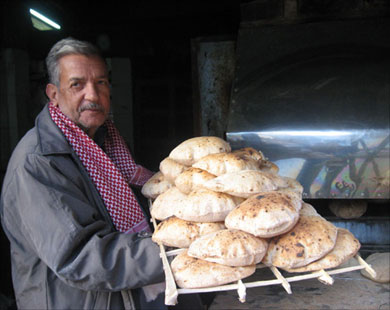 The government's reported intention to turn the in-kind State subsidies on baladi bread (flat rounds made with fortified flour), which has been maintained for more than four decades, to in-cash subsidies, has drawn mixed reactions from expert commentators and the public alike.
The government's reported intention to turn the in-kind State subsidies on baladi bread (flat rounds made with fortified flour), which has been maintained for more than four decades, to in-cash subsidies, has drawn mixed reactions from expert commentators and the public alike.
The shift has been prompted by the high wastage of baladi bread, which seriously fritters away the subsidies. The Government has apparently decided to channel its funds to the actually deserving consumers.Some economists find that the decision is flawed, considering market changes and high inflation. They believe that, although the cash with which the consumers will be compensated means that the bread will be sold at its actual cost, this cash subsidy would fail to cope with continual price rises. The recipients would start, in no time, to complain about the futility of the cash subsidy granted.Those in favour of the new approach believe that the in-kind subsidy has deprived many people, who deserve to receive this, of enjoying the benefit, especially given the crowds seeking to get their share of bread. Accordingly, in their opinion, cash seems to be the answer.The big question is: how will the government define the citizens who merit subsidies? Will it rely on the holders of ration cards? Yet again, some non-eligible citizens still have ration cards, which means that money will lose its way to beneficiaries who are not entitled. Supposing that the Government will manage, after all, to determine who are the deserving individuals, how will it pay the unemployed or those with irregular work? Although we admit the subsidy's noble aim, its application will not be as fair as intended.the public have to be convinced of the need to change their eating habits. Surprisingly, the poorest and the neediest comprise the highest category that wastes bread, by either using it as animal fodder or throwing away large amounts of leftovers. It is hoped that extensive studies will be conducted before the in-cash subsidy is introduced.



